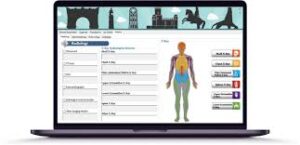The world is becoming more connected every single day as we speak, and so is everything with it. The healthcare sector has a crucial role in this picture. With people going to and from everywhere in the world, nowadays a digitalization of healthcare might be the next major upgrade in the field. It is obvious that this new approaches would make a bigger impact exactly where health is most at risk. Maybe we are about to witness the birth of a new device, the health passport from Abay-CHR.
What is Abay-CHR?
With more than 5000 professionals working with this startup and 1,200,000 of patients records Abay is fast gaining notoriety. The Abay-CHR solution is a patient-centered connected health record. It enables hospitals, clinics, and patients to have a continued digital solution that works over time and place. It was created by Dr. Wutela Lemma, who has worked for 28 years in the International Public Health. Her idea is to have Africa undergo a digital transformation in the health sector.

Through the management of data about patients and their conditions, patients can count on the best possible information available in every moment. Dr. Lemma also thinks that Abay-CHR and its solutions could soon have a role in a universal health digital passport.
Among Abay-CHR’s solutions we find ABAY-Andromeda: No code electronic medical record platform designer, Abay-CHR End-to-end comprehensive electronic medical record system, ABAY-CHR Tenadam: E-pharmacy and E-Prescription system, ABAY-CHR COVID: Complete in-patient, out-patient emergency pandemic response in a hospital or clinic context.

The supporting network
The startup has surely potential and has also had big supporters. Lalibela Global Networks has developed strong public and private partnership including; African Governments, African and North and South Universities, leading technology companies.
Wollo University in Ethiopia and Microdoft are providing their support, and 4 hospitals are using the Abay-CHR services. These hospitals are St. Peter’s Specialized Hospital (Addis Ababa, Ethiopia), Dessie Referral Hospital (Dessie, Ethiopia), Addis Ababa COVID-19 Field Hospital (Addis Ababa, Ethiopia) and Felege Hiwot Comprehensive Specialized Hospital (Bahir Dar, Ethiopia).
Why is it so important?
A lot of people might just not see the big advantages of digitalizing healthcare systems, so I am just trying to come at this from a different angle. Have you got any idea what could happen in situations of emergency with uncertain data in hand? For example, the doubts which arise when a person is in a different country with a different language and can’t give a clearl mistory history are just countless.
For instance, translation errors can be extremely expensive in terms of health and money. It was 1980 when Willie Ramirez, a 18-year-old boy, entered a Florida hospital in a comatose state. His family members tried to describe his condition to the doctors, but they only spoke Spanish. A bilingual staff member translated “intoxicado” as “intoxicated.” A professional interpreter would have known that “intoxicado” is closer to “poisoned” and doesn’t carry the same connotations of drug or alcohol use that “intoxicated” does.
As a result, despite suffering from intracerebral hemorrhage the doctors proceeded as if he were suffering from an intentional drug overdose. Some symptoms from both conditions can look alike, yet a better understanding of the context would have helped. However, because of the delay in treatment, Ramirez was left quadriplegic and he received a malpractice settlement of $71 million.
Although this example of mine might seem out of olace for you it really isn’t. Think about how much technology and the digitalization of healthcare could help. Especially in countries with the burden of widespread diseases like Africa, the end to end, fast accessible data available through digital devices could make a significant difference.
Thank you for your interest, to our next upgrade.
